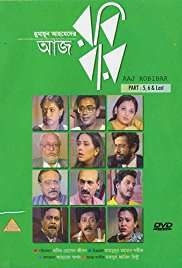Aaj Robibar
| Aaj Robibar | |
|---|---|
 DVD release cover | |
| Genre | Comedy, Drama |
| Created by | Humayun Ahmed |
| Written by | Humayun Ahmed |
| Directed by | Monir Hossain Jibon |
| Starring | |
| Theme music composer | Maksud Jamil Mintu |
| Opening theme |
"Loke Bole" and "Nisha Lagilo Re" by Hason Raja |
| Country of origin | Bangladesh |
| Original language(s) | Bengali |
| No. of episodes | 7 |
| Production | |
| Production location(s) | Bangladesh Television Studios |
| Cinematography | Mahmudur Rahman Sharif |
| Editor(s) | Ahmed Shopon |
| Running time | Around 50 minutes |
| Production company(s) | Nuhash Films |
| Distributor | Nuhash Films |
| Release | |
| Original network | BTV |
| Original release | 1999 |
Aaj Robibar (Bengali: আজ রবিবার; Today's Sunday) is a Bangladeshi television sitcom, created by Humayun Ahmed, that was originally aired on BTV in 1999. It was re-aired in Hindi on Indian television channel, Star Plus in 2017.[1][2]
Plot
The plot revolves around the day-to-day life of an eccentric household consisting of a man only called Dadajan ("grandpa"), his socially in-adept sons, two granddaughters, a boarder, the manservant and the maid.
A drama about the daily comic incidents taking place in a Dhaka household, the series' opening episode begins with Konka, the younger granddaughter who breaks the fourth wall to introduce characters and premises to the audience. She and her elder sister Titli are fun-loving girls, both secretly in love with the boarder Anis, a nerd who doesn't seem to understand social stuff and never shows affection for any of them. Their father Jamil, the middle son and an architect by profession, is fond of Hason Raja songs and after losing his wife around the time when Konka was born, falls in love with an attractive, mature and intelligent woman named Meera, whom he hires as a governess. The eldest son, Asgor is an eminent psychiatrist and also falls in love with Meera. Meanwhile Farhad, who looks like "Baker vai" becomes involved with the family. Asgor, being convinced by Titli and Konka, hypnotizes Anis to induce the loving soul of him and changes him completely. Anis, then run after Titli and expresses his love for her, and seeks love in turn. In the end, Farhad goes outside with the younger brother of the house to see the miseries of the poor people of the street, and the younger brother says, he needs not to be Himu anymore if Farhad becomes Himu.
Cast
- Abul Khair (actor) as Dadajan, head of the household
- Abul Hayat as Jamil, Dadajan's middle son
- Asaduzzaman Noor as Farhad
- Zahid Hasan as Anis, the boarder
- Suborna Mustafa as Meera, the governess
- Aly Zaker as Asgor, the eldest son who is a psychiatrist
- Shaon as Titli, the elder granddaughter
- Shila Ahmed as Konka, Titli's younger sister
- Faruk Ahmed as Moti, the manservant
- Dipak Kumar Sur as the youngest son, who thinks of himself as "Himu" (A fictional character of Humayun Ahmed)
References
- ↑ Sagor, Faridur Reza. "The Brilliance of Humayun Ahmed". The Daily Star. Retrieved 15 August 2015.
- ↑ Alom, Zahangir. "Humayun Ahmed's musical creations under spotlight". The Daily Star. Retrieved 15 August 2015.